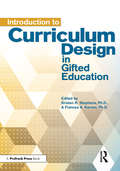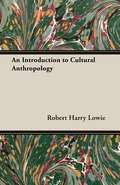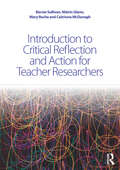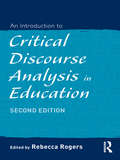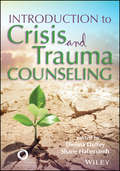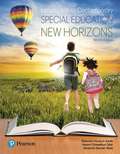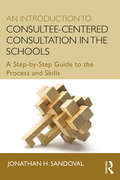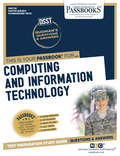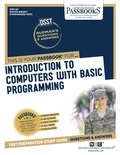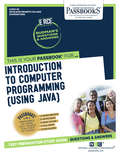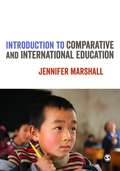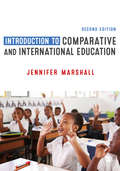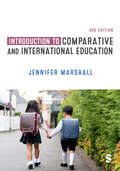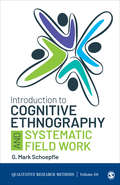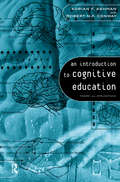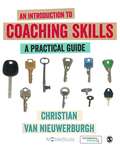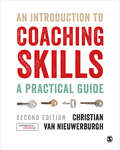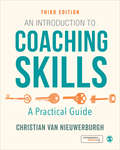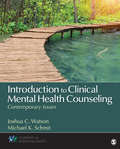- Table View
- List View
Introduction to Curriculum Design in Gifted Education
by Kristen R. StephensGifted students require a curriculum that intentionally aligns with their advanced abilities to ensure engagement at the appropriate level of intensity and depth. Introduction to Curriculum Design in Gifted Education offers an in-depth exploration of curriculum development for the gifted. Included are the general foundations of good curriculum design, a survey of curriculum models appropriate for gifted learners, an examination of design considerations across content areas, a detailed analysis of the role assessment has in the curriculum development process, and an exploration of trends and future directions of curriculum development for the gifted. Each chapter is authored by experts with considerable knowledge pertaining to curriculum implications for gifted students and is written with the practitioner in mind to facilitate effective implementation. This text is an essential addition to the library of any educator seeking to create new and/or adapt existing curriculum to better address the interests and abilities of gifted students.
Introduction to Critical Reflection and Action for Teacher Researchers: A Step-by-step Guide
by Bernie Sullivan Máirín Glenn Mary Roche Caitriona McDonaghIntroduction to Critical Reflection and Action for Teacher Researchers provides crucial direction for educators looking to improve their teaching and maximise learning. While many students can grasp the basic elements of researching their practice and can write about practitioner research, some need guidance and assistance to reflect meaningfully on their teaching practice so as to articulate their educational values. This book provides this guidance. By exploring how to engage in an authentic, practical and personalised framework, the book encourages critical reflection and action on educational practice. Moving through the process of reflecting on practice, engaging in critical thinking and planning and taking action, it helps the reader to subsequently generate educational theory from their own personal learning. Examples from the authors’ experiences illustrate the issues raised in each section, with ‘Pause and Reflect’ activities, guidelines for conducting a research project and annotated further reading available for every chapter. Introduction to Critical Reflection and Action for Teacher Researchers is based on the idea that reflection is in itself a deliberate action and something we must live - it is key to understanding our practice and is a core component of action research. This book is a valuable guide for teachers, trainee teachers and researchers interested in reflecting on and enhancing their teaching practice.
An Introduction to Critical Discourse Analysis in Education
by Rebecca RogersAccessible yet theoretically rich, this landmark text introduces key concepts and issues in critical discourse analysis and situates these within the field of educational research. The book invites readers to consider the theories and methods of three major traditions in critical discourse studies – discourse analysis, critical discourse analysis, and multimodal discourse analysis -- through the empirical work of leading scholars in the field. Beyond providing a useful overview, it contextualizes CDA in a wide range of learning environments and identifies how CDA can shed new insights on learning and social change. Detailed analytic procedures are included – to demystify the process of conducting CDA, to invite conversations about issues of trustworthiness of interpretations and their value to educational contexts, and to encourage researchers to build on the scholarship in critical discourse studies. This edition features a new structure; a touchstone chapter in each section by a recognized expert (Gee, Fairclough, Kress); and a stronger international focus on both theories and methods. NEW! Companion Website with Chapter Extensions; Interviews; Bibliographies; and Resources for Teaching Critical Discourse Analysis.
Introduction to Crisis and Trauma Counseling
by Thelma Duffey Shane Haberstroh“Now more than ever, this text is needed. The authors do a wonderful job of tackling the topics most critical in counseling trauma survivors. The resilience-based perspective and the focus on prevention is refreshing and reinforces the idea that people are survivors who are able to thrive even in the darkest and most difficult of times. This book is essential reading for all counselors.” —Victoria E. Kress, PhD, Youngstown State University “This book provides an exceptional review of the contemporary sociopolitical issues, historical perspectives, and clinical skills critical to effective crisis and trauma healing. Incorporating issues of power, privilege, culture, ecological context, and relational dynamics affords a unique perspective and makes this resource a must for anyone working in the area of trauma and crisis.” —Frederic P. Bemak, EdD, Professor Emeritus, George Mason University, Founder and Director, Counselors Without Borders This introductory text integrates evidence-based models and best practices with relational-cultural theory, which is responsive to the many forms of traumatic stress and tragedies that clients experience. It is a unique contribution that emphasizes the power of the connections counselors form with clients and communities in crisis and the means by which counselors can intervene, inspire growth, and promote healing during times of tragedy and loss. Readers will gain vital skills as they learn real-life approaches to crisis work with diverse populations in a variety of settings, including individuals, families, communities, students, military personnel, violence survivors, and clients who are suicidal. The authors provide strength-based, trauma-informed applications of cognitive behavioral therapy, behavioral therapy, neurofeedback, mindfulness, and creative practices. In addition, each chapter contains compelling case examples, multiple-choice and essay questions, and key topic discussion prompts to guide student learning and promote classroom discussion. *Requests for digital versions from the ACA can be found on wiley.com. *To request print copies, please visit the ACA website here. *Reproduction requests for material from books published by ACA should be directed to permissions@counseling.org Thelma Duffey, PhD, is professor and chair in the Department of Couns
Introduction to Contemporary Special Education: New Horizons
by Deborah Smith Naomi Tyler Kimberly SkowIntroduction to Contemporary Special Education: New Horizons presents an introduction to the professional practices, trends, and research that define contemporary special education while also conveying the diversity and excitement of this changing field.
An Introduction to Consultee-Centered Consultation in the Schools: A Step-by-Step Guide to the Process and Skills (Consultation, Supervision, and Professional Learning in School Psychology Series)
by Jonathan H. SandovalDrawing on historical writings about mental health consultation and on contemporary research and theory, Jonathan Sandoval lucidly explains the consultee-centered approach to consultation. The book provides an expert foundation on which to build a training program for future school-based consultants. Written for graduate students in school psychology, counseling psychology, special education, and social work, this book is an invaluable resource for mental health professionals working in schools who wish to upgrade their professional skills and grow as reflective practitioners. Individual chapters describe different stages in the consultation process; outline the processes characterized in each stage; detail useful consultant skills; review pertinent research; discuss the ethical principles underlying practice; and suggest self-monitoring questions for student consultants. Featuring a step-by-step developmental model of the consultee-centered consultation process, this book encourages consultants to prioritize those characteristics that contribute to a consultee’s work difficulty, in addition to assessing the client more generally. By detailing this unique approach, this concise volume provides an applicable, contextualized, and strategic form of consultation, and fosters a professional-to-professional relationship distinguishable from supervision, counseling, therapy, coaching or other methods.
INTRODUCTION TO COMPUTING: Passbooks Study Guide (DANTES Subject Standardized Tests (DSST))
by National Learning CorporationThe DSST Subject Standardized Tests are comprehensive college and graduate level examinations given by the Armed Forces, colleges and graduate schools. These exams enable students to earn college credit for what they have learned through self-study, on the job, or by other non-traditional means. The DSST Introduction to Computing / Information Technology Passbook® prepares candidates for the DSST exam, which enables schools to award credit for knowledge acquired outside the normal classroom environment. It provides a series of informational texts as well as hundreds of questions and answers in the areas that will likely be covered on your upcoming exam, including but not limited to: hardware and software; communications and networks; social impact; and more.
INTRODUCTION TO COMPUTERS COMPUTER COURSE - Andhra University SDE 1st Year B.A B.Com B.Sc
by Ma PrasadThis is the prescribed book for Introduction to Computers as part of the foundation for distance education students of BA, BCom and BSC in Andhra University, School of Distance Education
INTRODUCTION TO COMPUTERS: Passbooks Study Guide (DANTES Subject Standardized Tests (DSST) #Dantes-50)
by National Learning CorporationThe DSST Subject Standardized Tests are comprehensive college and graduate level examinations given by the Armed Forces, colleges and graduate schools. These exams enable students to earn college credit for what they have learned through self-study, on the job, or by other non-traditional means. The DSST Introduction to Computers with Basic Programming Passbook® prepares candidates for the DSST exam, which enables schools to award credit for knowledge acquired outside the normal classroom environment. It provides a series of informational texts as well as hundreds of questions and answers in the areas that will likely be covered on your upcoming exam, including but not limited to: hardware and software; communications and networks; social impact; and more.
Introduction to Computer Programming: Passbooks Study Guide (Excelsior/Regents College Examination Series)
by National Learning CorporationThe Excelsior/Regents College Examinations (E/RCE) offer you an opportunity to obtain recognition for college-level learning and consists of exams designed to demonstrate achievement and mastery of various college-level subjects, such as the Arts and Sciences, Business, Criminal Justice, Education, Health and Nursing. The E/RCE Introduction to Computer Programming (Using Java) Passbook® prepares you by sharpening knowledge of the skills and concepts necessary to succeed on the upcoming exam and the college courses that follow. It provides a series of informational texts as well as hundreds of questions and answers in the areas that will likely be covered on your upcoming exam, including computer operations; principles of computer programming; knowledge of Java; and more.
Introduction to Comparative and International Education
by Jennifer MarshallComparative and international education is an increasingly important area of study. This book introduces major themes surrounding globalisation and education, giving you a nuanced understanding of key debates, thinkers and sources of information. Important theories and research exploring how globalisation has influenced educational practice are critically examined, providing you with an understanding of relevant social, economic, historical and cultural factors. Coverage includes: Case studies from around the world raising thought-provoking questions on chapter topics How to undertake research using significant secondary sources of comparative international data (including OECD, PISA, TIMMS) The relationship between development, education and inequality The purpose and role of multicultural and citizenship education Gender and education in a global context This is essential reading for students on undergraduate Education Studies degrees, and for similar courses covering comparative and international education.
Introduction to Comparative and International Education
by Jennifer MarshallThis book introduces major themes surrounding comparative and international education, giving you a nuanced understanding of key debates, and thinkers, and the tools necessary to conduct comparisons using secondary sources. Social, economic, historical, and cultural factors are examined in order to investigate the varied contexts in which education takes place around the globe. Fully updated throughout, this second edition includes: A new 'Key concepts' feature explaining essential ideas and principles Additional case studies from non-Western education systems Updated statistical data highlighting educational and demographic trends This is essential reading for students on undergraduate Education Studies degrees, and for similar courses covering comparative and international education. Jennifer Marshall is Senior Lecturer in Education at the University of Derby.
Introduction to Comparative and International Education
by Jennifer MarshallThis book introduces major themes surrounding comparative and international education, giving you a nuanced understanding of key debates, and thinkers, and the tools necessary to conduct comparisons using secondary sources. Social, economic, historical, and cultural factors are examined in order to investigate the varied contexts in which education takes place around the globe. Fully updated throughout, this second edition includes: A new 'Key concepts' feature explaining essential ideas and principles Additional case studies from non-Western education systems Updated statistical data highlighting educational and demographic trends This is essential reading for students on undergraduate Education Studies degrees, and for similar courses covering comparative and international education. Jennifer Marshall is Senior Lecturer in Education at the University of Derby.
Introduction to Comparative and International Education
by Jennifer MarshallThis book introduces major themes surrounding comparative and international education, giving you a nuanced understanding of key debates, and thinkers, and the tools necessary to conduct comparisons using secondary sources. Social, economic, historical, and cultural factors are examined in order to investigate the varied contexts in which education takes place around the globe. This new edition includes: New case studies touching on contemporary issues from decolonising the curriculum to the impact of the Covid-19 pandemic on education A new introduction outlining the features of the book and how to use them Updated educational data from around the world and new links to external resources Dr Jennifer Marshall is Senior Lecturer in Education at the University of Derby.
Introduction to Comparative and International Education
by Jennifer MarshallThis book introduces major themes surrounding comparative and international education, giving you a nuanced understanding of key debates, and thinkers, and the tools necessary to conduct comparisons using secondary sources. Social, economic, historical, and cultural factors are examined in order to investigate the varied contexts in which education takes place around the globe. This new edition includes: New case studies touching on contemporary issues from decolonising the curriculum to the impact of the Covid-19 pandemic on education A new introduction outlining the features of the book and how to use them Updated educational data from around the world and new links to external resources Dr Jennifer Marshall is Senior Lecturer in Education at the University of Derby.
Introduction to Cognitive Ethnography and Systematic Field Work (Qualitative Research Methods)
by G. Mark SchoepfleIntroduction to Cognitive Ethnography and Systematic Field Work by G. Mark Schoepfle provides a guide to the fundamentals of cognitive ethnography for qualitative research. A focus of this technique is collecting data from flexible but rigorous interviews. These interviews are flexible because they are designed to be structured around the semantic knowledge being elicited from the speaker, not around some pre-conceived design that is based on the researcher’s background, and they are rigorous because the basic linguistic and semantic structures are shared among all cultures. Written by one of the founders of this technique, this text provides a wealth of concentrated knowledge developed over years to best suit this collaborative and participant-centric research process. Eight chapters show how intertwined data collection and analysis are in this method. The first chapter offers a brief history and overview of the cognitive ethnography. Chapter 2 covers planning a research project, from developing a research question to ethics and IRB requirements. The next two chapters cover interview background, techniques, and structures. Chapter 5 addresses analysis while Chapter 6 covers transcription and translation. Chapter 7 covers observation, while a final chapter address writing a report for both consultants and outside audiences.
Introduction to Cognitive Ethnography and Systematic Field Work (Qualitative Research Methods)
by G. Mark SchoepfleIntroduction to Cognitive Ethnography and Systematic Field Work by G. Mark Schoepfle provides a guide to the fundamentals of cognitive ethnography for qualitative research. A focus of this technique is collecting data from flexible but rigorous interviews. These interviews are flexible because they are designed to be structured around the semantic knowledge being elicited from the speaker, not around some pre-conceived design that is based on the researcher’s background, and they are rigorous because the basic linguistic and semantic structures are shared among all cultures. Written by one of the founders of this technique, this text provides a wealth of concentrated knowledge developed over years to best suit this collaborative and participant-centric research process. Eight chapters show how intertwined data collection and analysis are in this method. The first chapter offers a brief history and overview of the cognitive ethnography. Chapter 2 covers planning a research project, from developing a research question to ethics and IRB requirements. The next two chapters cover interview background, techniques, and structures. Chapter 5 addresses analysis while Chapter 6 covers transcription and translation. Chapter 7 covers observation, while a final chapter address writing a report for both consultants and outside audiences.
An Introduction to Cognitive Education: Theory and Applications
by Adrian Ashman Robert ConwayThis book provides an accessible introduction to the field of cognitive education. It explains the concepts commonly found in the cognitive psychology and cognitive education literatures, theories and models of human thinking and intelligent behavior, and how these have been applied to psychoeducational assessment, instruction, and the adaption of student behavior. The book includes numerous examples to explain the concepts, theories, and applications, and includes supplementary reading lists and study questions.
An Introduction to Coaching Skills
by Christian Van NieuwerburghAn Introduction to Coaching Skills is an invaluable resource for novice and trainee coaches. Its accessible, step-by-step style acquaints you with the key skills needed to become a successful coach and, with its focus on the applied side of coaching, the book is an essential text for anyone starting out on their coaching voyage. From the 'how to', through to practicalities and challenges and honing existing skills, this book covers: - Definitions of coaching - How to become a coach - Key coaching skills - Current coaching models - Practical tools and techniques - Reflective practise and how best to help others With evidence-based research, activities and suggestions for further reading, this is a clear and practical, all-you-need guide to becoming a coach.
An Introduction to Coaching Skills: A Practical Guide
by Dr Christian Van NieuwerburghThis text is an invaluable resource for novice and trainee coaches. Its accessible, step-by-step style acquaints you with the key skills needed to become a successful coach. It takes you from the 'how to', through to practicalities and challenges, and beyond to the continued development of your skills. There is even more packed into the new edition, with: over 70 videos of real coaching; including two full length sessions for you to engage with a closer look at coaching processes and models to support your understanding new activities (including templates to download) to try with clients stories from practice to give context to the skills being discussed. A world-wide success, this is a stimulating, inspiring and hugely practical book that you’ll come back to time and time again.
An Introduction to Coaching Skills: A Practical Guide
by Dr Christian Van NieuwerburghThis text is an invaluable resource for novice and trainee coaches. Its accessible, step-by-step style acquaints you with the key skills needed to become a successful coach. It takes you from the 'how to', through to practicalities and challenges, and beyond to the continued development of your skills. There is even more packed into the new edition, with: over 70 videos of real coaching; including two full length sessions for you to engage with a closer look at coaching processes and models to support your understanding new activities (including templates to download) to try with clients stories from practice to give context to the skills being discussed. A world-wide success, this is a stimulating, inspiring and hugely practical book that you’ll come back to time and time again.
An Introduction to Coaching Skills: A Practical Guide
by Dr. Christian van NieuwerburghThis bestselling book introduces you step-by-step to the key skills needed to become a successful coach. Supported by an Online Resource site with over 70 videos of coaching in action, this practical book will be an invaluable resource for novices and trainee coaches. To access the exclusive SAGE Videos, please see the code on the inside front cover of your textbook and click on &“Login&” above. If you have purchased the eBook from Amazon or another online retailer, please email UK.DigitalContent DigitalContent@sagepub.co.uk> with the subject line &“Access Code Required&” and we will assist further.
An Introduction to Coaching Skills: A Practical Guide
by Dr. Christian van NieuwerburghThis bestselling book introduces you step-by-step to the key skills needed to become a successful coach. Supported by an Online Resource site with over 70 videos of coaching in action, this practical book will be an invaluable resource for novices and trainee coaches. To access the exclusive SAGE Videos, please see the code on the inside front cover of your textbook and click on &“Login&” above. If you have purchased the eBook from Amazon or another online retailer, please email UK.DigitalContent DigitalContent@sagepub.co.uk> with the subject line &“Access Code Required&” and we will assist further.
Introduction to Clinical Mental Health Counseling: Contemporary Issues
by Dr Joshua Watson Michael K. SchmitIntroduction to Clinical Mental Health Counseling presents a broad overview of the field of clinical mental health and provides students with the knowledge and skills to successfully put theory into practice in real-world settings. Drawing from their experience as clinicians, authors Joshua C. Watson and Michael K. Schmit cover the foundations of clinical mental health counseling along with current issues, trends, and population-specific considerations. The text introduces students to emerging paradigms in the field such as mindfulness, behavioral medicine, neuroscience, recovery-oriented care, provider care, person-centered treatment planning, and holistic wellness, while emphasizing the importance of selecting evidence-based practices appropriate for specific clients, issues, and settings. Aligned with 2016 CACREP Standards and offering practical activities and case examples, the text will prepare future counselors for the realities of clinical practice.
